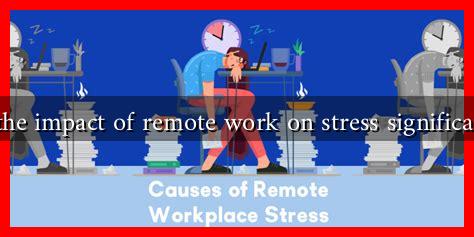-
Table of Contents
Is the Impact of Remote Work on Stress Significant?
The shift to remote work has been one of the most significant changes in the workplace landscape, especially accelerated by the COVID-19 pandemic. While many employees have embraced the flexibility and convenience of working from home, questions arise about the psychological implications of this new work environment. One of the most pressing concerns is whether remote work significantly impacts stress levels among employees. This article delves into the relationship between remote work and stress, exploring both the benefits and challenges it presents.
The Positive Aspects of Remote Work
Remote work offers several advantages that can contribute to reduced stress levels for many employees. Here are some key benefits:
- Flexibility: Remote work allows employees to create their own schedules, which can lead to a better work-life balance. This flexibility can reduce stress associated with rigid office hours.
- Elimination of Commute: The absence of a daily commute saves time and reduces the stress associated with traffic, public transport, and the overall hustle of getting to and from work.
- Personalized Work Environment: Employees can tailor their workspace to suit their preferences, which can enhance comfort and productivity.
- Increased Autonomy: Remote work often comes with greater independence, allowing employees to manage their tasks without micromanagement, which can alleviate stress.
According to a survey conducted by Buffer in 2021, 32% of remote workers cited flexibility as the primary benefit of working from home, highlighting its importance in reducing stress.
The Challenges of Remote Work
Despite its advantages, remote work also presents unique challenges that can contribute to increased stress levels. Some of these challenges include:
- Isolation: Working remotely can lead to feelings of loneliness and disconnection from colleagues, which can negatively impact mental health.
- Blurred Boundaries: The line between work and personal life can become blurred, leading to longer working hours and difficulty in disconnecting from work.
- Communication Barriers: Remote work can hinder effective communication, leading to misunderstandings and increased frustration among team members.
- Increased Workload: Some employees may feel pressured to prove their productivity while working from home, leading to overwork and burnout.
A study published in the Journal of Occupational Health Psychology found that remote workers reported higher levels of emotional exhaustion compared to their in-office counterparts, indicating that the challenges of remote work can indeed lead to increased stress.
Case Studies and Statistics
Several organizations have conducted studies to assess the impact of remote work on employee stress levels. For instance, a report by the American Psychological Association (APA) found that 61% of remote workers experienced increased stress due to the challenges of balancing work and home responsibilities. Conversely, a study by Owl Labs revealed that remote workers are 22% happier than those who work in traditional office settings, suggesting that the overall impact of remote work on stress can vary significantly based on individual circumstances.
Strategies to Mitigate Stress in Remote Work
To harness the benefits of remote work while minimizing its stressors, organizations and employees can implement several strategies:
- Establish Clear Boundaries: Set specific work hours and communicate them to colleagues to maintain a healthy work-life balance.
- Encourage Regular Check-Ins: Foster communication through regular team meetings and one-on-ones to combat feelings of isolation.
- Promote Mental Health Resources: Provide access to mental health support and resources to help employees manage stress effectively.
- Encourage Breaks: Remind employees to take regular breaks to recharge and avoid burnout.
Conclusion
The impact of remote work on stress is multifaceted, with both positive and negative implications. While remote work can offer flexibility and autonomy that reduce stress, it also presents challenges such as isolation and blurred boundaries that can increase stress levels. Organizations must recognize these dynamics and implement strategies to support their employees in navigating the remote work landscape effectively. By fostering a supportive environment, companies can help mitigate stress and enhance overall employee well-being in this new era of work.
For further reading on the psychological effects of remote work, you can explore resources from the American Psychological Association.

